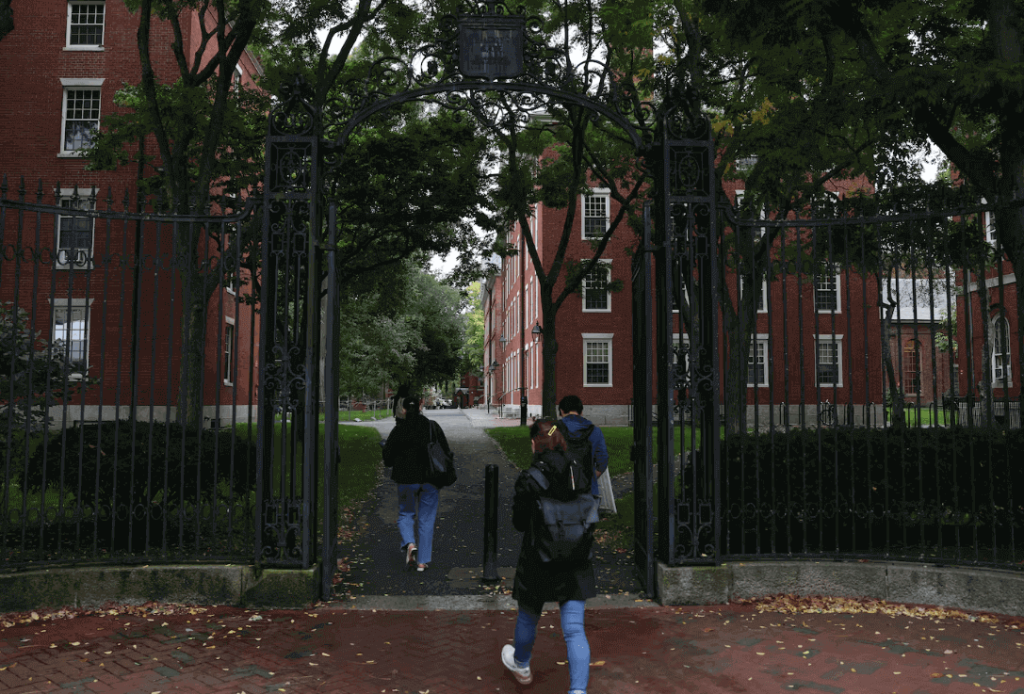【中美创新时报2024 年 11 月 2 日编译讯】(记者温友平编译)哈佛大学教授周五反驳了一份关于校园反犹太主义的新国会报告,称他们担心政治过度干预大学事务,以及许多学者认为这是全国范围内对政治活动和言论自由的打压。《波士顿环球报》记者希拉里·伯恩斯对此作了下述报道。
这份长达 325 页的报告由共和党领导的众议院教育和劳动力委员会周四发布,报告称,自去年秋天哈马斯领导的对以色列的袭击以来,大学领导人未能在校园内对抗反犹太主义。
“我觉得这很令人沮丧,”哈佛大学美国历史和非洲裔及非洲裔美国人研究教授文森特·布朗说。“这看起来不像是在试图保护校园里的学生。当你阅读这份报告时,你会发现,他们所担心的似乎是大学未能惩罚他们的学生。我从事教育工作不是为了惩罚我的学生。”
布朗和其他教授指责共和党委员会成员试图用一份有偏见和不公平的报告来诋毁高等教育机构,该报告忽视了大学校园中普遍存在的其他形式的仇恨。
“这是一份伪装成国会报告的政治暗杀,”哈佛大学政府学教授史蒂文·列维茨基说。
国会委员会的一位发言人说:“认为这项调查是政府越权的荒谬说法是不准确的,也没有事实依据。
“这项调查一直是为了保护犹太学生的安全,”发言人说。“就是这样。”
该报告包括委员会根据传票获得的哈佛管理人员的内部电子邮件,这些电子邮件显示了他们对 10 月 7 日哈马斯袭击和以色列军事反应的联合声明措辞的审议。哈佛大学的声明是在巴勒斯坦裔美国人两天前发表的一份有争议的学生团体声明之后发表的,引起了校友和政界人士的强烈反对。他们表示,哈佛大学本应将 10 月 7 日的袭击事件谴责为恐怖主义,而不是试图将这次袭击与以色列的回应相提并论。
时任哈佛大学校长的 Claudine Gay 于一天后的 10 月 10 日发表了另一份声明,谴责“哈马斯犯下的恐怖主义暴行。无论个人对该地区长期冲突的根源有何看法,这种惨无人道的行为都是令人憎恶的。” 现任哈佛大学校长、当时的教务长 Alan Garber 于 11 月 10 日告诉《哈佛深红》学生报,他“对第一份声明感到遗憾”。 报告中的消息显示,Garber 不同意哈佛大学其他领导关于在联合声明中删除对袭击的描述中的“暴力”一词的意见。
对于几位教授来说,国会报告并没有提供有关去年哈佛事件的有意义的新信息或见解。哈佛大学法学教授、朱利斯-拉比诺维茨犹太和以色列法项目创始人诺亚·费尔德曼表示,这并不能证明“花费纳税人的钱”用于资助国会调查是合理的。报告中的内部电子邮件显示,哈佛大学的管理人员(其中几位是犹太人)“正在认真思考难题,并在困难的情况下尽最大努力”,费尔德曼说。
“你不希望在做出艰难决定的过程中考虑一系列立场吗?”
随着去年秋天捐赠者的强烈反对,盖伊和麻省理工学院和宾夕法尼亚大学的校长于 12 月 5 日在由北卡罗来纳州共和党人弗吉尼亚·福克斯领导的教育和劳动力委员会面前就亲巴勒斯坦抗议活动和反犹太主义抬头的报道作证。委员会领导人要求所有三位女校长辞职,因为她们对呼吁对犹太人进行种族灭绝是否违反大学规则的问题给出了法律上的答案。几天后,宾夕法尼亚大学前校长利兹·马吉尔(Liz Magill)在受到大额捐赠者和宾夕法尼亚州州长的严厉批评后辞职。盖伊于 1 月 2 日辞职,原因是她的学术作品涉嫌抄袭,并遭到捐赠者的强烈反对。
哈佛大学发言人表示,学校“坚定不移地努力创造一个安全、包容的环境”,与文明对话、校园分裂、纪律和抗议规则相关的工作“正在进行中”。
“反犹太主义在我们的校园里没有立足之地,我们在整个大学加大了倾听、学习、支持和提升犹太社区的努力,肯定了他们在哈佛的重要地位,”发言人说。
10 月 7 日的哈马斯袭击造成约 1,200 名以色列人死亡,另有 250 人被绑架。巴勒斯坦卫生当局表示,在以色列的军事反应中,约有 42,000 人丧生,他们的数字没有区分平民和战斗人员。这场战争在上一学年引发了哈佛大学和其他大学的广泛抗议,5 月,哈佛大学采取了中立政策,其领导人不再对世界事件发表正式评论,除非这些事件直接影响到大学业务。
前本科学院院长、计算机科学教授哈里·刘易斯 (Harry Lewis) 表示,他没有在共和党报告中披露的内部通讯中发现任何“启示性”内容。然而,他认为整个大学的纪律应该更加一致,并解释说,大学内的不同学院负责监督学生的纪律。
“住在一栋楼里的学生可能会受到截然不同的惩罚(或奖励!),这取决于他们是来自法学院还是神学院,”刘易斯在一封电子邮件中写道。
哈佛公司高级研究员彭妮·普利兹克 (Penny Pritzker) 在接受国会委员会采访时也表示,哈佛各处的纪律委员会“在执行方面存在着不均衡的现象”。普利兹克称这种缺乏一致性是一个“非常严重的问题”。
该报告没有提到最近几周哈佛学生和教职员工因在图书馆内默默抗议中东战争而受到纪律处分。在加伯被任命为该校的常任校长直至 2027 年之后,这所常春藤盟校在秋季学期开始前明确了其言论和抗议规则。一些学生和教授表示,由于新规则的出台,秋季学期变得更加平静,但也有人表示这些规则太过分,限制了言论自由。
费尔德曼说,经营任何大型机构都很困难,在传票威胁下经营,担心自己的言论被公开,这让领导者更难履行职责。
“当国会以这种高度侵入的方式干涉校园生活时,这对大学里所有想表达自己观点的人都会产生寒蝉效应,”费尔德曼说。“这对大学的核心功能——追求真理——极为不利。”
最近从哈佛大学毕业的 Shabbos Kestenbaum 就该校对校园反犹太主义的反应起诉了该校,他说,学校管理人员就如何措辞声明的讨论表明他们“道德沦丧”。
尤其是,凯斯滕鲍姆说,他和其他犹太学生在一些交流中感到“个人被背叛”,其中包括哈佛医学院院长乔治·戴利的一次交流,他建议管理人员从学校 10 月 9 日的联合声明中删除“暴力”一词,以避免“追究责任”。(戴利在去年 10 月 30 日的一份声明中表示,在听到悲痛的社区成员的诉说后,他“深刻反思了自己对当前危机的反应”。)
“对于犹太社区来说,这是我们的十月惊喜,”凯斯滕鲍姆说。“我们感到被背叛,我们感到受伤,我们感到愤怒。我们想要问责。”
题图:人们进入哈佛园。Jessica Rinaldi/Globe Staff
附原英文报道:
Harvard professors bash congressional report on antisemitism as ‘political hit job’
By Hilary Burns Globe Staff,Updated November 1, 2024
People entered Harvard Yard.Jessica Rinaldi/Globe Staff
Professors at Harvard University pushed back Friday against a new congressional report about campus antisemitism, citing concern about political overreach into university affairs and what many academics view as a nationwide crackdown on political activism and free speech.
The 325-page report, released Thursday by the Republican-led House Committee on Education and the Workforce, argues university leaders have failed to confront antisemitism on their campuses since the Hamas-led attack on Israel last fall.
“I find it pretty upsetting,” said Vincent Brown, Harvard professor of American history and African and African American Studies. “This doesn’t look like they’re trying to protect students on campus. When you read the report, overwhelmingly, it looks like what they’re concerned with is universities’ failure to punish their students. I didn’t get into education to punish my students.”
Brown and other professors accused Republican committee members of setting out to make institutions of higher education look bad with a biased and unfair report that ignores other forms of hate prevalent on college campuses.
“It’s a political hit job disguised as a congressional report,” said Steven Levitsky, a Harvard government professor.
A spokesperson for the congressional committee said, “The ridiculous notion that this investigation is government overreach is inaccurate and not grounded in reality.
“This investigation has always been about keeping Jewish students safe,” the spokesperson said. “Period.”
The report includes internal emails from Harvard administrators which the committee obtained under subpoena that show their deliberations over the wording of a joint statement about the Oct. 7 attack by Hamas and Israel’s military response. The Harvard statement, which followed a controversial statement from student groups, written by Palestinian Americans two days earlier, prompted backlash from alumni and politicians. They said Harvard should have condemned Oct. 7 as terrorism rather than trying to find equivalence between the attack and Israel’s response.
Then-Harvard president Claudine Gay released another statement one day later on Oct. 10 condemning “the terrorist atrocities perpetrated by Hamas. Such inhumanity is abhorrent, whatever one’s individual views of the origins of longstanding conflicts in the region.” Current Harvard president Alan Garber, who was provost at the time, told the Harvard Crimson student newspaper on Nov. 10 he had “regrets about the first statement.” Garber disagreed with other Harvard leaders about removing the word “violent” in a description of the attack in the joint statement, according to messages in the report.
To several professors, the congressional report does not offer meaningful new information or insight about events at Harvard last year. It did not justify the “expenditure of taxpayer dollars” that funded the congressional investigation, said Noah Feldman, Harvard professor of law and founding director of the Julis-Rabinowitz Program on Jewish and Israeli Law. The internal emails in the report show Harvard administrators, several of whom are Jewish, “thinking hard about hard problems, and trying their best under difficult circumstances,” Feldman said.
“Wouldn’t you want there to be a range of positions considered in the course of making a difficult decision?” Feldman said.
As donor backlash picked up last fall, Gay and the presidents of the Massachusetts Institute of Technology and the University of Pennsylvania were called to testify about pro-Palestinian protests and reports of rising antisemitism in front of the Education and Workforce Committee, led by North Carolina Republican Virginia Foxx, on Dec. 5. Committee leaders called for all three female presidents to resign after they provided legalistic answers to questions about whether calling for the genocide of Jews violated university rules. Former UPenn president Liz Magill resigned days later following sharp criticism from large donors and the governor of Pennsylvania. Gay resigned Jan. 2 amid allegations of plagiarism in her academic work and donor backlash.
A spokesperson for Harvard said the university is “steadfast in our efforts to create a safe, inclusive environment” and that work related to civil dialogue, divisions on campus, discipline, and protest rules is “ongoing.”
“Antisemitism has no place on our campus, and across the university we have intensified our efforts to listen to, learn from, support, and uplift our Jewish community, affirming their vital place at Harvard,” the spokesperson said.
The Oct. 7 Hamas attack killed about 1,200 Israelis, and another 250 were kidnapped. Palestinian health authorities say about 42,000 have been killed during Israel’s military response, their figures do not distinguish between civilians and combatants. The war triggered widespread protests at Harvard and other universities in the last academic year, and in May Harvard adopted a policy of neutrality in which it leaders would no longer officially comment on world events unless they directly impact university business.
Harry Lewis, a former dean of the undergraduate college and a computer science professor at the school, said he didn’t find anything “revelatory” in the internal communications exposed in the Republican report. However, he believes discipline across the university should be more consistent, explaining that different schools within the university oversee discipline for their students.
“[S]tudents occupying a building might get drastically different penalties (or rewards!) depending on whether they are from the Law School or the Divinity School,” Lewis wrote in an email.
In an interview with the congressional committee that was also included in the report, Harvard Corporation Senior Fellow Penny Pritzker also said disciplinary boards across Harvard “have been uneven in their enforcement.” Pritzker called this lack of consistency a “very serious issue.”
The report does not mention that Harvard students and faculty members have been disciplined in recent weeks for silently protesting the war in the Middle East inside a library. The Ivy League school clarified its rules for expression and protest ahead of the fall semester after Garber was named the permanent leader of the university until 2027. Some students and professors say the fall semester has been calmer as a result of the new rules, though others say the rules go too far and limit free expression.
Running a large institution of any kind is difficult, Feldman said, and doing so under threat of a subpoena and worrying that your statements could be made public makes it harder for leaders to do their jobs.
“When Congress interferes in this highly intrusive way in the life of the campus, that has a chilling effect on everybody in the university who wants to express their points of view,” Feldman said. “That’s extremely detrimental to the core function of the university, which is the pursuit of truth.”
Shabbos Kestenbaum, a recent Harvard graduate who has sued the university over its response to campus antisemitism, said the discussion among school administrators over how to word their statement revealed them to be “morally bankrupt.”
In particular, Kestenbaum said he and other Jewish students felt “personally betrayed” at some of the exchanges, including one from Harvard Medical School Dean George Daley who suggested administrators remove the word “violent” from the school’s Oct. 9 joint statement to avoid “assigning blame.” (Daley said in a statement on Oct. 30 of last year that he had reflected “deeply on my response to the current crisis” after hearing from grieving community members.)
“For the Jewish community, this was our October surprise,” Kestenbaum said. “We feel betrayed, we feel hurt, and we feel angry. We want accountability.”

